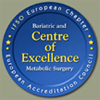Colorectal Proctology Surgical Unit
The mini-invasive Colorectal Proctology Surgical Unit has a long history in laparoscopic surgery as applied to the colon and rectum.
The mini-invasive Colorectal Proctology Surgical Unit at the Dr. Ballesta Laparoscopic Center primarily addresses the most common diseases affecting the colon and rectum, mainly hemorrhoids, fistulas, incontinence, diverticulitis, and colon cancer as diseases affecting more than 20 percent of the population in Spain.
The technology permits the use of tools such as the ultrasound scalpel, Doppler-guided rectal HAL, protein coagulation that can replace convention and traditional stitches and techniques, as well as provide benefits such as minimal stay of only 24 hours and a reduction in pain and complications, thus allowing a rapid return to work and normal daily activity.
The implementation of the ultracision system for hemorrhoid treatment uses ultrasonic energy to achieve hemostatic incisions and coagulation of hemorrhoidal tissue. By transforming the energy produced by the generator with a mechanical movement, the power and speed used to create the incision can be adjusted to the specific characteristics of each hemorrhoid process, thus producing minimal damage to the tissue being treated. This results in minimum pain during hemorrhoid surgery, reduces the period of hospitalization of complex diseases, and minimizes and eliminates blood loss and transfusions without compromising immunity — an important aspect for the cancer patient.
Appliedtechnology at the Dr. Ballesta Laparoscopic Center's Colorectal Proctology Unit:
Hemorrhoids stageI-II.
Doppler-guided rectal HAL.
Hemorrhoids stageIII-IV.
Ultrasound scalpel.
Fistulaand anal fissure.
Excision with protein coagulation.
Fecal incontinence.
Ultrasound and reconstruction.
Rectal tumor.
Colon tumors smaller than 0.5 cm.
Colon Diverticulitis, colon and rectal tumors, colon and rectal cancer.
Laparoscopic surgery.

